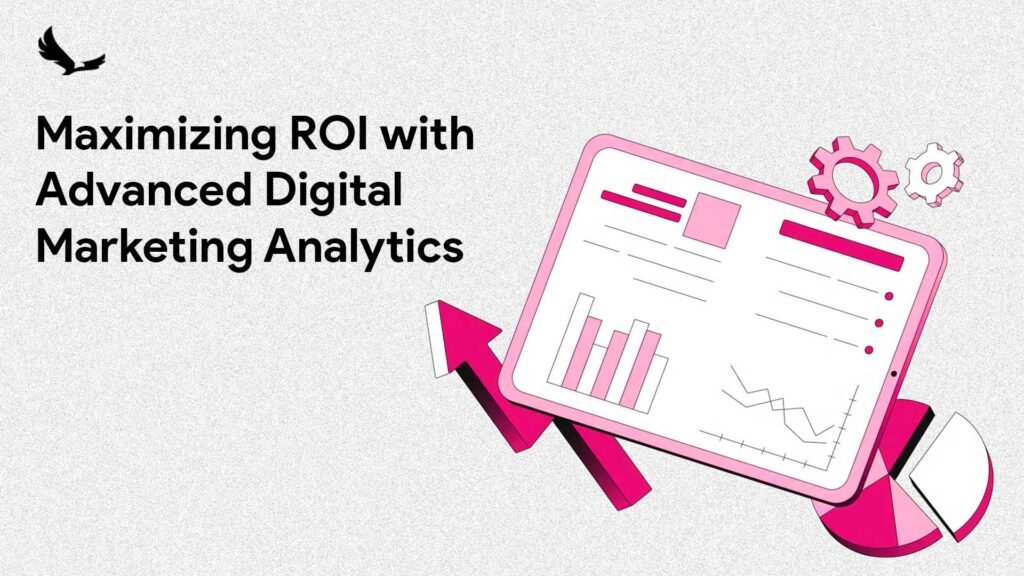Introduction to Maximizing ROI with Advanced Digital Marketing Analytics
In this article, we will delve into the world of digital marketing analytics, exploring what it is, why it’s essential, and how businesses can leverage advanced techniques and tools to maximize their ROI.
Understanding Digital Marketing Analytics
What are Digital Marketing Analytics?
Digital marketing analytics involves the collection, measurement, analysis, and interpretation of data related to a company’s digital marketing efforts. This includes data from various online channels such as websites, social media platforms, email campaigns, and online advertising.
The insights derived from digital marketing analytics help businesses understand their audience better, track the performance of their marketing campaigns, and optimize their strategies for maximum effectiveness.
The Importance of Data in Digital Marketing
Data is the lifeblood of digital marketing. Without accurate and actionable data, businesses would be operating blindly, making decisions based on guesswork rather than evidence.
Digital marketing analytics provides businesses with the data they need to understand their customers’ preferences, behaviors, and needs, allowing them to tailor their marketing efforts accordingly.
Key Metrics to Measure in Digital Marketing
In digital marketing, there are several key metrics that businesses should track to gauge the success of their campaigns. These include:
- Traffic sources: Where are your website visitors coming from? Understanding this can help you allocate your marketing resources more effectively.
- Conversion rate: What percentage of your website visitors are taking the desired action, whether it’s making a purchase, filling out a form, or signing up for a newsletter?
- Customer lifetime value (CLV): How much revenue can you expect to generate from a single customer over the course of their relationship with your business?
- Return on investment (ROI): Are your marketing efforts generating a positive return on investment? This metric is crucial for evaluating the effectiveness of your campaigns and allocating your budget accordingly.
Advanced Techniques for Analyzing Digital Marketing Data
Implementing Multi-Touch Attribution Models
Traditionally, digital marketers have relied on last-click attribution models to determine which marketing channels are driving conversions. However, this approach fails to account for the multiple touchpoints that often precede a conversion.
Multi-touch attribution models, on the other hand, take into account all the touchpoints along the customer journey, allowing businesses to more accurately attribute conversions to the various marketing channels that contributed to them. By implementing multi-touch attribution models, businesses can gain a more holistic view of their marketing performance and make more informed decisions about resource allocation.
Utilizing Predictive Analytics for Forecasting
Predictive analytics involves using historical data to predict future outcomes. In the context of digital marketing, predictive analytics can help businesses forecast things like customer lifetime value, churn rates, and future sales trends.
By leveraging predictive analytics, businesses can anticipate future trends and adjust their marketing strategies accordingly, allowing them to stay one step ahead of the competition.
Leveraging AI and Machine Learning in Data Analysis
Artificial intelligence (AI) and machine learning (ML) are revolutionizing the field of digital marketing analytics. These technologies can analyze vast amounts of data in real-time, uncovering patterns and insights that would be impossible for humans to detect manually.
By leveraging AI and ML algorithms, businesses can automate many aspects of their data analysis process, freeing up time for marketers to focus on more strategic tasks. Additionally, AI-powered analytics tools can provide more accurate and actionable insights, helping businesses make smarter decisions and achieve better results.
Tools and Platforms for Advanced Digital Marketing Analytics
Google Analytics 360 Suite
Google Analytics 360 Suite is a comprehensive analytics platform designed for enterprise-level businesses. It offers a wide range of features, including advanced reporting, data visualization, and audience segmentation capabilities.
With Google Analytics 360 Suite, businesses can gain a deeper understanding of their customers’ behavior and optimize their marketing strategies for maximum impact.
Adobe Analytics
Adobe Analytics is another powerful analytics platform that provides businesses with actionable insights into their digital marketing efforts. It offers advanced features such as real-time data collection, predictive analytics, and cross-channel attribution modeling.
With Adobe Analytics, businesses can track the entire customer journey across multiple touchpoints, allowing them to deliver more personalized and targeted marketing experiences.
IBM Digital Analytics
IBM Digital Analytics is a robust analytics platform that helps businesses measure and optimize their digital marketing performance. It offers features such as real-time reporting, advanced segmentation, and predictive analytics capabilities.
With IBM Digital Analytics, businesses can gain a deeper understanding of their customers’ behavior and identify opportunities for growth and optimization.
Case Studies: Real-Life Examples of Maximizing ROI through Analytics
Case Study 1: E-commerce Company
An e-commerce company used advanced digital marketing analytics to analyze customer data and identify opportunities for personalization. By segmenting their audience based on past purchase behavior and browsing history, they were able to deliver targeted marketing messages that resonated with their customers, resulting in a significant increase in sales and ROI.
Case Study 2: SaaS Startup
A SaaS startup leveraged predictive analytics to forecast customer churn and identify at-risk customers before they canceled their subscriptions. By implementing targeted retention campaigns based on these insights, they were able to reduce churn rates and increase customer lifetime value, ultimately driving higher ROI for their business.
Case Study 3: Digital Agency
A digital agency used multi-touch attribution modeling to accurately attribute conversions to the various marketing channels that contributed to them. By reallocating their marketing budget to the most effective channels, they were able to optimize their clients’ campaigns for maximum ROI, resulting in increased revenue and client satisfaction.
Best Practices for Implementing Advanced Digital Marketing Analytics
Setting Clear Goals and KPIs
Before diving into advanced digital marketing analytics, it’s essential to establish clear goals and key performance indicators (KPIs) for your campaigns. By defining what success looks like upfront, you can ensure that your analytics efforts are aligned with your business objectives and focus on measuring the metrics that matter most.
Ensuring Data Accuracy and Quality
The accuracy and quality of your data are paramount to the success of your digital marketing analytics efforts. Garbage in, garbage out—meaning that if your data is inaccurate or incomplete, the insights you derive from it will be unreliable. Therefore, it’s crucial to invest in data quality assurance processes and tools to ensure that your data is clean, consistent, and up-to-date.
Continuous Learning and Adaptation
The digital marketing landscape is constantly evolving, with new technologies, trends, and consumer behaviors emerging all the time. To stay ahead of the curve, businesses must embrace a culture of continuous learning and adaptation. This means staying abreast of the latest developments in digital marketing analytics, experimenting with new tools and techniques, and constantly refining your strategies based on the insights you glean from your data.
Overcoming Challenges in Digital Marketing Analytics
Data Privacy and Compliance
With the increasing emphasis on data privacy and security, businesses must navigate a complex landscape of regulations and compliance requirements when collecting and analyzing customer data. From GDPR in Europe to CCPA in California, there are numerous laws and regulations that govern how businesses can collect, store, and use personal data. By staying informed about these regulations and implementing robust data privacy practices, businesses can ensure that they remain compliant while still harnessing the power of digital marketing analytics.
Integrating Data from Multiple Sources
In today’s omnichannel world, customer interactions can occur across a wide range of touchpoints, from websites and social media platforms to mobile apps and offline channels. Integrating data from these disparate sources can be a significant challenge for businesses, as it requires overcoming technical barriers and ensuring data consistency and accuracy across platforms. However, by investing in data integration tools and platforms, businesses can break down silos and gain a unified view of their customers, enabling them to deliver more personalized and seamless experiences across channels.
Skills Gap and Training Needs
Digital marketing analytics requires a unique skill set that combines technical expertise with a deep understanding of marketing principles and business strategy. However, many businesses struggle to find employees with the right skills and experience to fill roles in this field. To address this skills gap, businesses should invest in training and development programs to upskill their existing employees and attract top talent from the market. By building a team of skilled analysts and data scientists, businesses can unlock the full potential of digital marketing analytics and drive better results for their organization.
Conclusion: The Future of Digital Marketing Analytics
In conclusion, advanced digital marketing analytics holds tremendous potential for businesses looking to maximize their ROI and gain a competitive edge in today’s digital landscape. By harnessing the power of data and leveraging advanced techniques and tools, businesses can gain deeper insights into their customers’ behavior, optimize their marketing strategies for maximum impact, and drive better results across the board.
However, to fully realize the benefits of digital marketing analytics, businesses must overcome challenges such as data privacy and compliance, data integration, and skills gaps. By addressing these challenges head-on and embracing a culture of continuous learning and adaptation, businesses can unlock the full potential of digital marketing analytics and thrive in an increasingly data-driven world.




